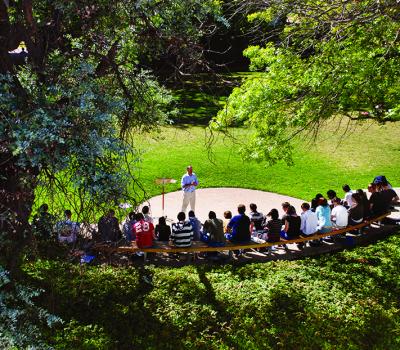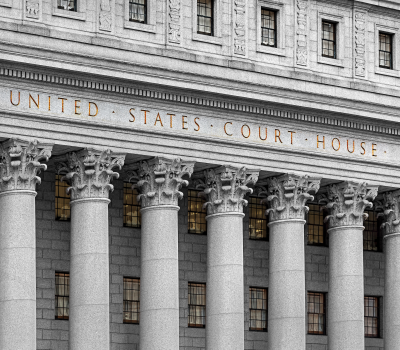Hear world-class legal scholarship and more
ANU Master of Laws program director Dr Philippa Ryan speaks with Dr Bill Boothby, convenor of Cyber Warfare Law (LAWS8035). Join them as they explore whether existing law can be sensibly applied in the cyber context and the prospects of new law in these areas, all while referring to Dr Boothby’s past research and his co-authored publication of the ‘Tallinn Manual on the International Law Applicable to Cyber Warfare’ (2013).

Presented by the ANU Centre for Public International and Public Law (CIPL) and ANU Law Reform and Social Justice, The Honourable Justice Rachel Pepper (BA '92, LLB (Hons) '94) delivered a seminar, 'Costs in Public Interest Climate Change Litigation', on 11 October 2019.
Justice Pepper explored how the possibility of an adverse costs order can have a significant deterrent on the bringing of litigation in this lunchtime seminar. These costs can be sizable in climate change litigation, which is often novel and where the competing legal issues typically involve complex scientific questions necessitating the provision of costly evidence.
The chilling effect of an adverse costs order is all the more acute in public interest litigation - where an applicant (who tends to be a not-for-profit community group or an individual) before the court may gain no direct personal benefit from the litigation.
Presented by Professor Anne Brunon-Ernst and Assistant Professor Claire Wrobel this seminar explored the Bentham’s Panopticon scheme that has triggered a wide range of political, philosophical and literary responses. The present research wishes to shed new light on panoptic references in “Vigilance” (Patrick McGrath, 1989), Green River Rising (Tim Willocks, 1994) and The Panopticon (Jenni Fagan, 2013) from a prison management perspective, focusing on the representations of prison staff and management, rather than on inmates.

ANU College of Law Master of Laws (LLM) program director Dr Philippa Ryan speaks with Associate Professor Jo Ford, convenor of Business, Human Rights and Corporate Responsibility (LAWS8254). Listen as they discuss the controversial issues surrounding the ways that business activities could affect the enjoyment of human rights, through areas of AI, data governance, facial recognition, supply chains responsibilities, working conditions and industry sectors. Will technology as a tool add visibility and accountability of insightful automation or will it become problematic?
Read about Business, Human Rights and Corporate Responsibility (LAWS8254) here.

ANU Master of Laws program director Dr Philippa Ryan speaks with Associate Professor Jolyon Ford, convenor of Business, Human Rights and Corporate Responsibility (LAWS8254). Listen as they discuss the controversial issues surrounding the ways that business activities could affect the enjoyment of human rights, through areas of AI, data governance, facial recognition, supply chains responsibilities, working conditions and industry sectors. Will technology as a tool add visibility and accountability of insightful automation or will it become problematic?

There are divided views on the merits of editing a book. Is it a burden, or does it present an opportunity to work with a collection or scholars/peers in publishing new scholarship in a field? Is the work of the book editor properly recognised within the academy and by the ANU? Would the time spent on editing a book be better spent on writing a new journal article on the field of enquiry that the proposed edited book will address? Are there other, less burdensome options to publishing a collection of papers that are derived from a workshop/conference?

In this talk, Dr Matt Qvortrup considers if referendums have ever been compatible with the ideal of deliberative and discursive democracy? If there are mechanisms that can make referendums more deliberative and if we should have referendums even if they violate the norms of deliberative democracy? The talk will be based on last year’s referendums in capitalist economies, with a special reference to Brexit.

The sanctity of contracts is commonly referenced in public discourse, but the reality is that contracts are often malleable documents open to renegotiation and sometimes even vitiation. To navigate the boundaries between enforcing an existing deal and permitting variation, contract law uses a series of basic tools including consideration and conscience. The efficacy of these legal tools will likely be tested by the black swan event of the coronavirus, explains Dr Dilan Thampapillai in this research seminar.

Our induction session and welcome to international and exchange students held on 16 July 2019.

ANU College of Law Master of Laws program director Dr Philippa Ryan speaks with Dr Sarah Steele FRSA, FHEA, convenor of #MeToo and the Law (LAWS8403). Listen as they discuss the #MeToo movement that aims to bring awareness to the general public and put an end to gender-based violence and sexual discrimination.

ANU Master of Laws program director Dr Philippa Ryan speaks with Dr Dominique Dalla-Pozza, convenor of Australian Legal Responses to National Security and Counter-Terrorism (LAWS8328).
Dr Dalla-Pozza discusses why national security and civil rights are both important and need to be balanced carefully. Australia has a heavy reliance on parliamentary processes to get this balance right, but how is this achieved during a crisis? And what is seen as the most pressing national security concerns currently in Australia?

Alissa Irgang (BActSt/LLB (Hons ‘10), GDLP ’12) is a director at Canberra-based consulting firm Callida Consulting. She started out as an actuary before pivoting to assurance and risk where she currently does a lot of problem-solving work for the government in her current role.
...

This research seminar presentation by Dr Solene Rowan focuses on the struggle to reshape contract law in a coherent way and in reconciling these different values.

Political parties have featured in constitutional practice and theory largely in the context of party bans by militant democracies. In this seminar, Professor Tarun Kaitan (University of Melbourne) will argue that democratic constitutions should seek to achieve two design objectives in relation to political parties:

Misleading Silence as the Basis for Insider Trading Liability under the U.S. Federal Securities Laws
This presentation contends that U.S. insider trading law would have been much more coherent, as well as far more effective in attaining Congress’s and the SEC’s policy goals, had the Supreme Court regarded the breach of a fiduciary disclosure duty as a sufficient condition -- rather than a necessary condition -- for insider trading liability under SEC Rule 10b-5.
It further contends that while federal courts can still theoretically broaden their application of the common law in insider trading cases, tradition and the sheer passage of time makes the judiciary unwilling to do so. A new federal statute that would prohibit securities trading on the basis of “wrongfully obtained information” is therefore the best way forward.

The ANU Law Reform and Social Justice (LRSJ) Indigenous Reconciliation Project hosted a panel discussion on Next Steps: Towards Reconciliation on 24 September 2019.
The panel discussed key recommendations from The Uluru Statement From the Heart, including Voice, Treaty, Truth, and the next steps we must take towards reaching true reconciliation.

In this seminar, Emeritus Professor Stephen Bottomley FAAL will outline a work-in-progress that examines how, for the most part, shareholders have escaped the broad critical public examination that other corporate players have received.
